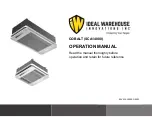
2.Failure phenomenon: The product will not receive a remote control signal.
>
Situation
@ǂ
The product does not receive a remote control signal. It is not very responsive.
(The product does run normally in response to the emergency operation switch.)
>
Estimated failure
locations
@
·
Remote control failure, remote control low battery level, remote control poorly set
·
Remote control light-receiving unit
·
Connector loose, wire break
·
Normal product (external factors: the remote control units for lighting equipment and other
equipment, electrical noise, etc.)
>
Cautions
@
>
Diagnosis flow
@
Initiating troubleshooting
·
Even if the product is trouble-free, a factor coming from outside the product may hamper the
reception of signals from the remote control unit.
·
Batteries may decline in capacity at low temperatures. Old batteries decline particularly much in
voltage in the morning and evening of winter, resulting in the poor arrival of remote control signals.
Instruct your users to use new alkaline batteries.
Does the remote control unit have a sufficient battery capacity?
If the liquid crystal display becomes
extremely faded when a remote control
signal is sent, replace the batteries.
No
Press the reset switch of the remote control unit,
then conduct another operation check.
Has the product worked?
Yes
Instruct your users to be sure to press
the reset switch after replacing the
batteries.
Yes
Did you identify a failure phenomenon?
Go on to "how to identify sources of
jamming in the reception of remote
control signals" .
No
Yes
Conduct an operation check according to "checking the remote
control".
Is the remote control normal?
No
Yes
Replace the "remote control unit".
No
Is the CN16 securely connected?
Yes
Reconnect the connector correctly.
Yes
Check for jamming due to an external factor while referring to
"how to identify sources of jamming in the reception of
remote control signals".
Is there jamming from outside?
Cope with jamming according to its cause.
No
No
Replace the "indicating P.W.B".
Cautions in replacing the indicating P.W.B
Be sure to replace the indicating P.W.B. components.
82
Summary of Contents for RAC-18WPD
Page 2: ... DANGER 2 ...
Page 24: ...24 ...
Page 25: ...25 ...
Page 26: ...26 ...
Page 28: ...Contact your sales agent immediately if the following phenomena should occur Notes 28 ...
Page 31: ...WIRING DIAGRAM RAK 15QPD RAK 18RPD RAK 25RPD RAK 35RPD RAK 42RPD RAK 50RPD 31 ...
Page 33: ...CIRCUIT DIAGRAM MODEL RAK 15QPD 33 ...
Page 34: ...CIRCUIT DIAGRAM MODEL RAK 18 25 35 42 50RPD 34 ...
Page 57: ...10 10 10 10 10 DSW1 57 ...
Page 61: ...RL1 RL1 RL2 61 ...
Page 70: ...68 70 ...
Page 73: ...37 and page 38 73 ...
Page 75: ...57 75 ...
Page 76: ...76 ...
Page 77: ... 䇭䇭 䇭䇭 䇭䇭 䇭䇭 䇭䇭 䇭䇭 B C E F 㺢 F 䌖 B GH E H C J E 77 ...
Page 78: ... 䇭䇭 G FK 㺢 F L M C B C M C E C B H C E B M C E C B M C 78 ...
Page 93: ...RAK 15QPD RAK 18RP RAK 25RP D D RAK 35RP RAK 42RP D D RAK RPD 50 JCH WH NO 0108E 93 ...












































